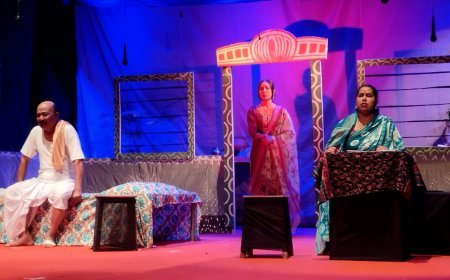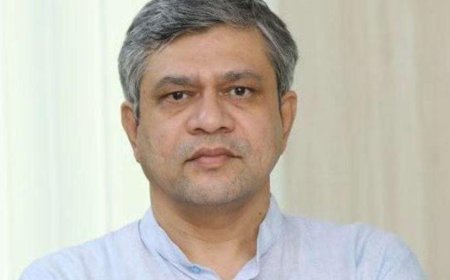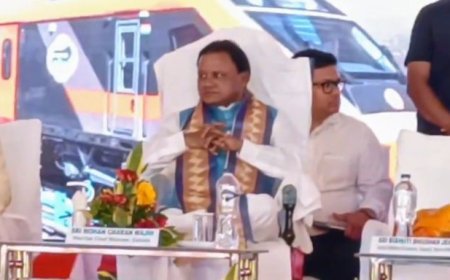VK Pandian: From Bureaucratic Luminary to the Scapegoat of a Tumultuous Election

Vairab Kartikeyan Pandian, known widely as VK Pandian, has long been a towering figure in Odisha’s administrative and political landscape. Born on 29 May 1974 in Kottampatti, Madurai district of Tamil Nadu, Pandian’s journey from a bright young student in Vellalapatti and Neyveli to a top-tier bureaucrat and eventually a key political strategist for the Biju Janata Dal (BJD) is a story of ambition, hard work, and complex political maneuvering.
Early Life and Academic Prowess
VK Pandian’s formative years in Tamil Nadu laid the foundation for a career marked by determination and excellence. After completing his schooling in Vellalapatti and Neyveli, he pursued a bachelor’s degree in agriculture from the Agricultural College Research Institute in Madurai. His academic journey continued with a master’s degree from the esteemed Indian Agricultural Research Institute in New Delhi. These formative experiences not only enriched his technical knowledge but also instilled in him a disciplined approach that would later define his administrative style.
A Stellar Career in Public Administration
In 1999, Pandian was selected for the Indian Revenue Service—a prelude to an illustrious career in public administration. The following year, he cleared the highly competitive Civil Services Examination, joining the Indian Administrative Service (IAS) as part of the Punjab Cadre. His career trajectory saw a significant turn when he was transferred to the Orissa Cadre on spouse grounds, where his administrative acumen would later be prominently displayed.
Over the years, Pandian earned a reputation for his proactive approach to governance. As a district collector and later as a trusted aide to Chief Minister Naveen Patnaik, he played a key role in modernising administrative practices, implementing innovative welfare schemes, and spearheading transformational projects—ranging from heritage conservation at Puri’s Jagannath Temple to initiatives aimed at promoting sports and education. His work garnered national recognition and established him as a capable problem-solver in challenging circumstances.
Transition to Politics and the Rise within BJD
Following his celebrated stint in bureaucracy, VK Pandian took the bold step of retiring from government service in October 2023. His subsequent appointment as Chairman of the Transformational Initiatives (5T) with cabinet minister rank signalled his deepening involvement in political affairs. On 27 November 2023, he formally joined the BJD, emerging as a close confidante of the long-serving Chief Minister Naveen Patnaik. Alongside his political endeavors, Pandian’s personal life also resonated with public interest—he is married to Sujata Rout Karthikeyan, an IAS officer of the 2000 batch, renowned for her leadership of Mission Shakti in Odisha, which empowered millions of women through self-help groups.
For a period, Pandian was hailed as the “one man army” of the BJD—a testament to his formidable influence and administrative expertise. His ability to implement complex initiatives and his close working relationship with Patnaik made him a linchpin in the party’s machinery.
The 2024 General Election: A Dramatic Turn of Events
However, the tide turned dramatically during the 2024 General Election. Once admired for his invincible administrative record, Pandian soon found himself at the centre of a political maelstrom. Critics within and outside the party began to attribute the electoral debacle of the BJD to the overconcentration of power around him. Many argued that the centralisation of authority in a single figure led to a disconnect with grassroots aspirations and provided fertile ground for opposition propaganda.
Political detractors contended that Pandian’s decisive influence over policy and campaign strategy had not translated into the broad-based support the party once enjoyed. Instead, this centralisation became an easy target for political adversaries, who claimed that the “one man army” mentality stifled diversity of ideas and alienated voters. Voices from within the party, as well as prominent political commentators, pointed to his leadership style as a key factor in the dramatic loss experienced by the BJD in both the state assembly and Lok Sabha elections.
Analysis and Future Implications
The controversy surrounding VK Pandian’s role in the 2024 election highlights the perennial challenges faced by political parties when administrative brilliance is conflated with political strategy. On one hand, his record as an efficient bureaucrat speaks to a legacy of transformative change and effective governance. On the other, the intense focus on his persona within the party appears to have backfired, with voters and party insiders alike questioning whether a centralized leadership model can truly address the multifaceted challenges of modern governance.
Critics argue that for a party with a rich democratic tradition like the BJD, relying excessively on one individual may undermine collective leadership and dilute accountability. The 2024 electoral outcome, therefore, serves as a cautionary tale about the risks of personality-driven politics—a phenomenon that not only jeopardises internal party cohesion but also opens the door for well-orchestrated opposition narratives.
Looking ahead, the future of VK Pandian’s political career remains uncertain. His decision to withdraw from active politics following the electoral setback has only deepened the debate over whether his influence was a boon or a bane for the BJD. As the party reassesses its strategies and grapples with internal dissent, the lessons from this electoral episode will likely shape the evolving dynamics of leadership and governance in Odisha.
In conclusion, VK Pandian’s journey from a dedicated bureaucrat to a key political strategist encapsulates the complex interplay between administrative excellence and political accountability. While his contributions to governance have been significant, the fallout from the 2024 General Election underscores the inherent risks of centralized power in a vibrant democratic system. Only time will tell how this saga influences the broader contours of Odisha’s political landscape and whether new leadership models will emerge in its wake.
Sanjay Pattnayak
Sundargarh













































